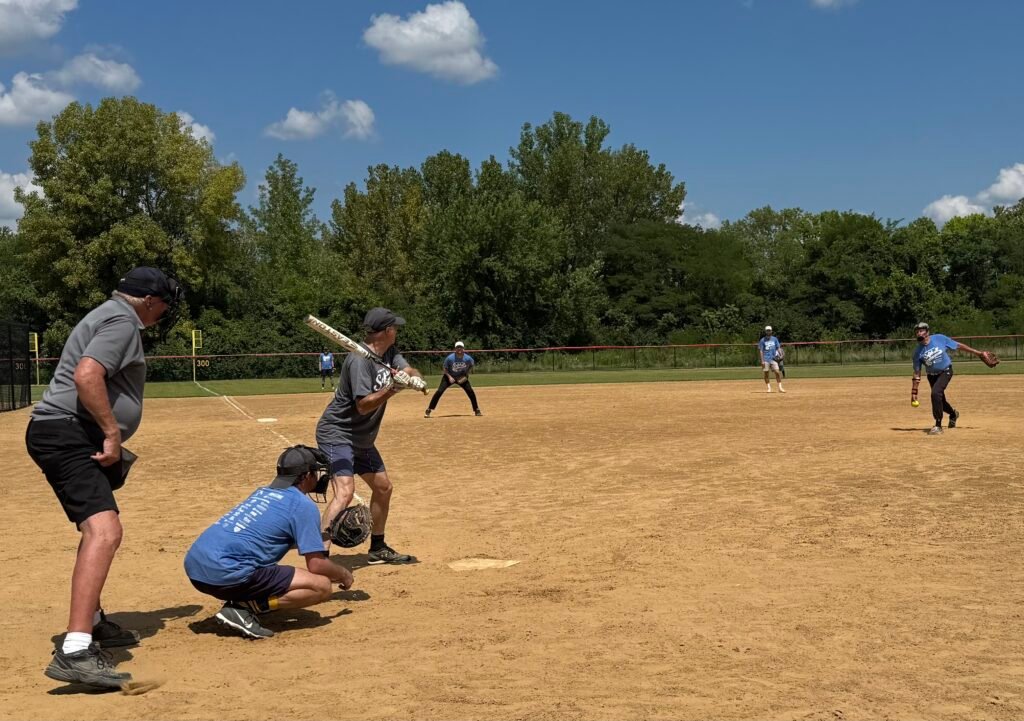A League That Feels Like Home

By Anna Selman
By early September, the JCC fast‑pitch softball season had settled into its easy rhythm—the kind of Sunday mornings at Triple Creek Park that felt like a breath of fresh air in a noisy world. Two diamonds going at once. Outfielders shading their eyes. Kids hanging off the fence hollering for Dad. Dugout chatter as steady as a metronome. No fights, no theatrics. Just Jews playing softball.
Ask around and you’d hear the same story: after World War II, a group of returning veterans picked up bats at the Jewish Community Center (JCC) in Roselawn and started something that became a tradition. The league outlasted ballfields, fashions and more than a few batting stances. It moved to Triple Creek and kept going because people cared enough to show up—guys like commissioner Adam Cronstein, who talked about the future the way only a lifer could: keep it going long enough to share the field with his kids.
The pride showed up in the details. Steve Zawatsky talked about finally playing alongside his son—that was always the goal—and about how the friendships out here quietly grew into family ties. Umpire Tom Johnson, who had been behind the plate for fourteen years, pointed to the secret sauce: the age range. On any given Sunday, a twenty‑something legged out an infield hit right after a sixty‑something dropped a curveball on the black. Father‑son lineups were normal. So was cheering for a rival’s kid.
Newer faces folded in just as naturally. Keith Kombrinck came over from the JCC basketball league on a friend’s recommendation and found a community that welcomed him in. The fast pitch was a real challenge, and that was exactly what he loved about it.
And then there was Howard Schwartz. At seventy‑seven, he had pitched in this league for sixty‑one seasons, starting back when you had to be sixteen to join. He began at the J in Roselawn and was still there on the mound, steady as ever. If the league had a living archive, it wore a glove.
Now the season was nearly over, the air turning from humid to hopeful, and the bracket had done what it always did—served up storylines. Team Groh had already punched its ticket to the championship. Team Brafman and Team Solomon were playing for the other slot after Team Solomon knocked out Team Wolf on Wednesday. The final was set for Wednesday, September 10, at Triple Creek, with first pitch that evening. The trophy waited at the JCC, polished like it understood its role in the week’s drama.
Deadlines mattered here in more than one way. The league ran on a calendar older than any bracket software—the championship had to wrap before Rosh Hashanah. So the schedule tightened as September did, tradition and logistics meeting in the usual truce: play hard, finish on time, start the year right.
What made the league special wasn’t only what happened between the dugouts. After games, the real work of community carried on—guys pulling tables together, sharing a late bite, swapping stories, welcoming a new player into the circle like he had always been there. The venue could change; the ritual didn’t. Week after week, those small moments stitched the community together as surely as any double play.
It was easy to be cynical about most things these days, but not about this. Here, disagreements ended with an out call, not an argument thread. The loudest thing on a Sunday morning was a dugout cheer. You could feel the city—the whole Cincinnati Jewish community, really—breathing a little easier in this space.
If you meant to catch a game, this was the week to do it—finals week. You might spot Howard in the stands, a father‑son double play, Steve grinning from the bench, Keith leaning in for the fast pitch, Tom brushing off the plate like he had a thousand times before. You would see why people kept coming back: because in a polarizing world, this league felt like home.
And when the last out dropped into a glove on Wednesday night, the habit would carry on as always—handshakes, laughter, dinner plans made in clumps. The bracket would be finished, the trophy engraved, and the real season—the one measured in friendships—would keep rolling, right on into the new year.